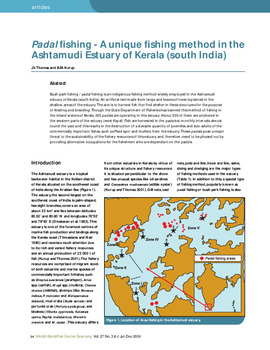Padal fishing - a unique fishing method in the Ashtamudi Estuary of Kerala (south India)

Citation
Thomas, J.V.; Kurup, B.M. (2004). Padal fishing - a unique fishing method in the Ashtamudi Estuary of Kerala (south India). Naga 27(3-4): 24-27
Bush park fishing / padal fishing is an indigenous fishing method widely employed in the Ashtamudi estuary of Kerala (south India). An artificial reef made from twigs and leaves of trees is planted in the shallow areas of the estuary. The aim is to harvest fish that find shelter in these structures for the purpose of feeding and breeding. Though the State Department of Fisheries has banned this method of fishing in the inland waters of Kerala, 400 padals are operating in this estuary. About 300 of them are anchored in the western parts of the estuary (west Kayal). Fish are harvested in the padals at monthly intervals almost round the year and this results in the destruction of a sizeable quantity of juveniles and sub-adults of the commercially important fishes, such as Pearl spot and mullets, from the estuary. These padals pose a major threat to the sustainability of the fishery resources of this estuary and, therefore, need to be phased out by providing alternative occupations for the fishermen who are dependant on the padals.
Permalink
Date Available
Type
Publisher
Countries
Copyright
CC BY 4.0
Research Themes
Topics
Language